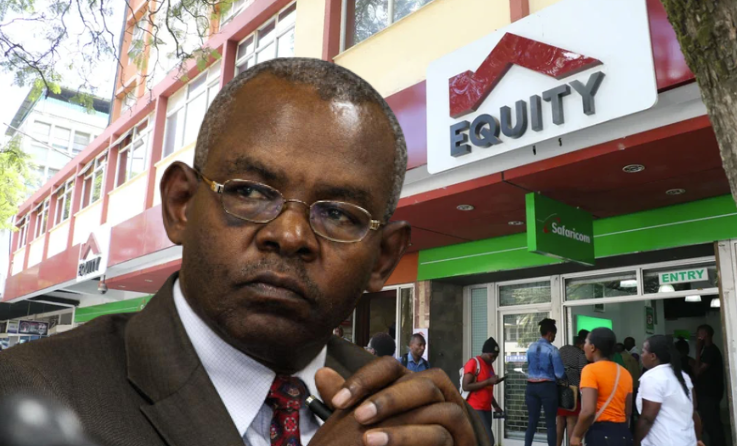A group of Equity Bank employees has petitioned the Central Bank of Kenya (CBK), the Ministry of Labour, the Federation of Kenya Employers (FKE), and the Kenya Bankers Association (KBA) over what they describe as an unfair, opaque, and discriminatory performance evaluation, bonus, and salary increment process for the 2024/2025 financial year.
In the detailed petition copied to multiple oversight institutions, the employees allege that the bank’s recently concluded performance and remuneration exercise breached the principles of fairness, transparency, and accountability as required under the Employment Act, the Labour Relations Act, and the prudential guidelines governing employee treatment within the banking sector.

The group, identifying itself as more than half of the affected workforce, seeks urgent intervention from regulators to investigate the process and to compel Equity Bank to provide clarity on the evaluation criteria applied.
At the centre of the petition is the allegation that the bank did not disclose the methodology used to determine staff eligibility for bonuses, salary adjustments, and Performance Improvement Plans (PIPs).
The employees argue that management failed to explain the metrics used to assess staff performance, leaving many in uncertainty regarding how results were arrived at.
Repeated internal appeals for clarification are said to have gone unanswered, deepening internal division and mistrust.
The petitioners contend that the criteria applied were inconsistent, citing cases where employees with lower evaluation scores received bonuses and increments, while others with higher ratings were placed on PIPs.
They state that the inconsistency in application of performance thresholds has led to confusion among staff, particularly where those deemed to have performed poorly were rewarded while others with demonstrably stronger evaluations were penalised.
The employees also allege that some former staff members, and even those currently under suspension, benefited from the recent adjustments, suggesting that the allocation of bonuses and increments was not grounded in any uniform or transparent standard.
Another major grievance concerns the simultaneous issuance of PIPs and bonuses within the same review cycle.
On the day when selected staff received confirmation of their bonuses and increments, others were reportedly served with PIP notifications without any prior warning or explanation.
The employees interpret this as evidence of bias and internal discrimination, asserting that the process created a perception of selective treatment.
The petition also raises the issue of pay disparities resulting from the recent adjustments.
It indicates that some officers now earn more than their supervisors, while employees in equivalent roles are remunerated at vastly different rates without any clear justification.
The letter further notes that management had claimed that newly appointed staff were ineligible for increments, yet certain recently recruited employees were granted salary increases.
The employees view this as discriminatory and inconsistent with established human resource norms.
A particularly grave allegation in the petition concerns the exclusion of women who were on maternity leave during the 2024/2025 financial year from the bonus and increment exercise.
The employees describe this as an act of gender-based discrimination and a breach of Article 27 and Article 41 of the Constitution, as well as Section 5 of the Employment Act, which explicitly prohibits discrimination based on gender or maternity status. The petition warns that such exclusion not only violates the law but also undermines the principle of equality within the workplace.
The employees also contest the process through which PIPs were administered.
They report that management has withheld the objective criteria used to identify those placed on performance plans.
Without disclosure of the governance framework or performance thresholds applied, staff argue that the process lacks fairness and does not meet the standard of procedural justice required under the Employment Act.
The PIP forms themselves are described as vague, providing general labels such as “below average” or “not meeting expectations” without specifying the actual targets, evidence, or metrics used.
In the absence of such detail, the affected employees contend that the process cannot be deemed objective.
According to the petition, some employees have been directed to sign their PIP documents under the threat of disciplinary action, even though the appeals process remains unresolved.
The employees argue that this directive undermines their right to fair administrative action and consultation.
Several formal appeals submitted to management have allegedly gone unanswered, leaving staff without a clear mechanism for review or redress.
The petitioners believe this silence from management has deepened mistrust and eroded morale within the institution.
In seeking intervention, the employees have requested the Central Bank of Kenya to investigate the matter and confirm whether Equity Bank is in compliance with fair labour and human resource governance standards.
They are also calling on the Ministry of Labour to conduct an independent review of the 2024/2025 performance evaluation, bonus, and PIP process, to ascertain whether it conforms with Kenyan labour law.
The petition demands that the Group Chief Executive Officer of Equity Bank provide a formal written explanation detailing the criteria used to determine who qualified for bonuses, increments, and PIPs. In addition, the employees are seeking the immediate suspension of all disputed PIPs until a transparent review has been conducted.
They have urged the relevant oversight bodies to respond to their petition within seven days of receipt, citing the urgency of restoring trust and stability within the institution.
According to the letter, the manner in which the 2024/2025 process was conducted has severely affected morale, damaged staff confidence, and created a hostile working environment.
The employees warn that failure to address these grievances could compromise the integrity of internal operations and erode confidence in one of the country’s most prominent financial institutions.
The petition concludes with an appeal for accountability and reform, asserting that Equity Bank has, over time, developed a culture of unfair and unequal treatment of its workforce.
The employees state that they no longer have faith in internal mechanisms and are therefore compelled to seek external intervention to protect their rights and to restore fairness, transparency, and respect for employee dignity within the organization.












































